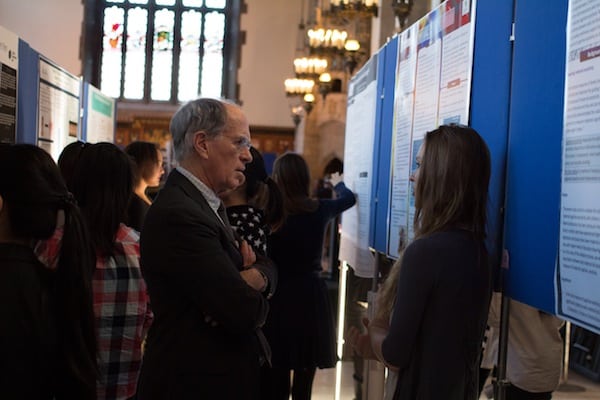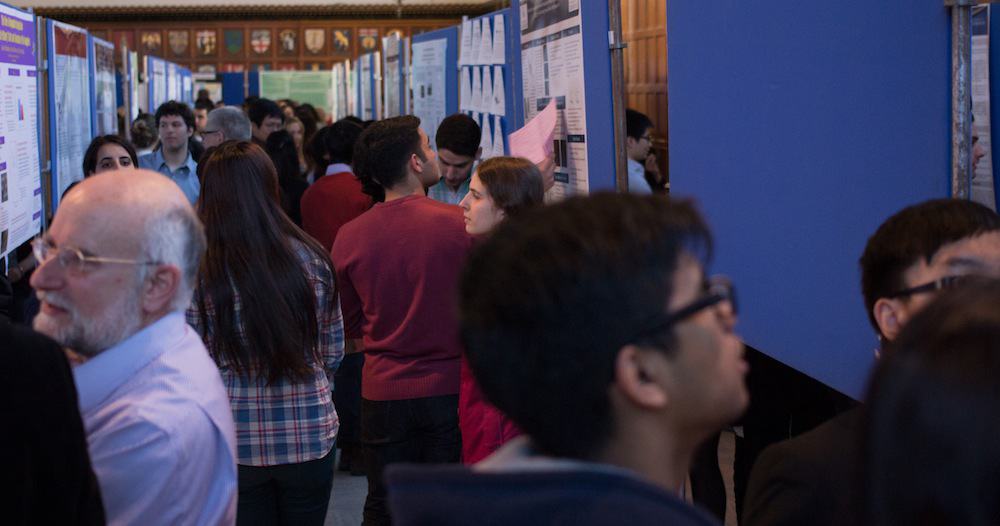On Thursday, March 6, Hart House’s Great Hall played host to around 90 student research projects. In a science-fair atmosphere, students had the chance to show off the results of months of hard work. The hall was packed with posters, presenters, and the curious students who came to learn about what their peers had accomplished. The Undergraduate Research Fair was multidisciplinary, topics ranged from art to zoology.
An undergradute research project is an entirely different experience than sitting in a lecture hall, or even conducting a guided experiment in lab courses. Jacob Chol participated in an earth sciences project studying volcanos in Hawaii along with two other undergraduates. “You cannot get what we get here in a lab or in a class,” he said.
Many students emphasized how participating in research supplements the classroom experience. Symon James-Elison, who worked on a psychology project examining a community-based tutoring program with at-risk adolescents, mentioned that the mentors and peers that taught her different ways of doing things come from different academic backgrounds. “We brought lots of different perspectives to our research,” she said, “which you don’t get to do in your standard classes, which can be very compartmentalized.”
Research programs also act as a career counsellor for second-year students who may be unsure of where their academic paths will take them. Priscilla Perez-Saval studied the photosynthetic efficiency of cryptophyte algae within the Department of Chemistry. “What I most like about the [second year] Research Opportunity Program is that it gives you a glance about what your future career will look like,” she said. “It shows you that it’s not only about understanding the concepts — it’s about trying to express that information.” Perez-Saval found that she could combine her interests in biology and chemistry by studying the chemistry behind biological systems. “I really would encourage students to take this step forward and just try to get involved,” she says.

Connie Tang and Jonathon Fossella worked on a chemistry project to develop a solvent-free aldol condensation reaction that will be used for CHM249, the second-year organic chemistry course. “I don’t know what I want to do with my life,” Tang said. “After doing this research experience, I’m seriously considering it as a career, which is something I never even thought of.” Fossella sees the experience in a different way. “I’m actually not super interested in research as a career,” he said. “The reason I applied for this opportunity is because it had a means to an end. It was doing work for an end goal to deliver to other people. After I’ve done this, research is becoming a little more interesting to me. I don’t think I want to do it for the rest of my life, but I think this is a really good exposure to being a scientist. ROP299 is just a really great experience on many different levels.”
Even those who have already decided to follow a research path can gain confidence in their career choice and develop new interests. Sara Pushdadian studied how dopamine levels, changed by the drug Ritalin, affect the colouring of guppies. “Guppies are the peacock of the fish world,” she explains. “Their gills are highly colourful and the females select for them. It’s a great example of sexual selection.” Pushdadian, who has always wanted to work with neurotransmitters, had her opinions of the inch-long fish change over the course of the research project. “At first you just think they’re so cute, but they actually have so much to tell you about evolution and the dopamine pathway. I am now a fish lover!”
Students were able to take ownership of their research, learning firsthand how scientific data is collected and manipulated. Natasha Ouslis worked with professor Ian Spence to study how 3D objects are imagined. “I really benefited from developing the paradigm, understanding the counterbalancing, fixing and repeating the task.” Research teaches students to take pride from the concrete results of their academics.”It’s been a great experience,” said Ouslis, “Being able to say ‘This is my work!’”
With files from Katrina Vogan.


